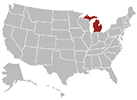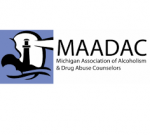
Have you gone through addiction and want to help people bounce back from this disease?
Well, a professional recovery coach might be the right career for you!
With just a little training, you can find a job with an addiction treatment center or even start a new business in peer support.
Here’s what you need to do if you live in Michigan and find this career interesting.
Page Navigation
Steps to Become a Professional Recovery Coach in Michigan
Becoming a Michigan professional recovery coach requires taking a few simple steps that can help you transition into this field.
Following the steps below should help you get on the right path toward certification and ensure that you start your career as quickly as possible.
Step One: Complete Your High School Training
Are you still in high school?
Well, you need to be at least 18 and have a high school degree to start a career in this field.
What if you dropped out of high school?
You can earn a GED instead.
This degree is equivalent to a high school diploma and lets you start your training as soon as you want.
In this way, it’s an essential step for earning your certification.
Step Two: Meet Basic Certification Guidelines
Once you’ve finished your high school degree, it’s important to meet a few standards for receiving your certification training in Michigan.
First, you must be at least 18 years old and have a job working at least 10 hours a week with a licensed Substance Use Disorder Treatment Organization, Community Mental Health Services Program, or a similar group.
You must also have received publicly-funded addiction treatment services and have two continuous years of recovery without using.
Then, you must be willing to share your recovery story and have a diagnosis of a substance use disorder.
You’ll then need to do some basic training with various state officials to qualify for the certification exam.
Note:
you also need two letters of reference to begin.
Step Three: Attend In-Person Training
Once you complete your application to become a certified peer recovery coach, you will attend five training days.
During your training, you’ll learn how to provide hands-on recovery support, including help for people with severe addiction problems.
These courses will help train you for the unique demands of this profession and ensure you can provide the help people need to recover.
During your training, you’ll also actively participate in discussions and role-playing games.
What are role-playing games?
They let you interact with people in recovery to better understand their life and their current situation.
Though they might seem simple at first, they’re a powerful way to improve your career and get a better understanding of what this job requires of you.
After you complete your five-day training, you can take the certification exam.
This test studies everything you learned during your course.
Don’t panic!
It typically covers things that you should easily know if you actively participated and took notes during your training.
After finishing the test, you complete a peer-to-peer phone interview to learn more about potential job options in your area.
Step Four: Look for Jobs
Now, you can start applying for jobs at addiction treatment centers and hospitals in Michigan. Your certification is good for the state, so you shouldn’t be able to get jobs outside of it. If you want to work elsewhere, you’ll need to finish that state’s certification program.
Schools in Michigan
While Michigan doesn’t offer a college program for professional recovery counselors, there are a few training programs that you can consider.
These give you the hands-on experience that you need to meet your training requirements and get certified in this rapidly growing field.
University of Michigan 
The University of Michigan’s veteran support program provides peer support training that can help military members support each other through recovery.
This program includes certification and support through the VA peer support mentoring program.
It’s designed specifically for veterans who have gone through addiction and who need help.
MAADAC
The Michigan Association of Alcoholism and Drug Abuse Counselors (MAADAC) provides training support for multiple career paths, including adolescent, adult, senior, women, and veteran recovery support.
These programs help you earn the appropriate certification for your job and can make it easier to transition to a full-time position.
Recovery Coach Representative Schools in Michigan – Summary Table
Top 2 Schools in Michigan
| School Name | Address |
|---|---|
| University of Michigan | 500 S State St, Ann Arbor, MI 48109, United States |
| MAADAC | 3839 W Burnham St, Milwaukee, WI 53215, United States |
Salary
A Michigan recovery coach will make about $34,005 on average every year.
That compares favorably to the national average, which is about $34,337.
Higher-earning recovery coaches can make around $38,404 nationally and $38,089 on average in Michigan.
As a result, counselors in this state can feel comfortable earning a competitive wage.
Annual Salary Range:Average Salary of Professional Recovery Coachs in Michigan
| City Name | Salary |
|---|---|
| Detroit | $34,718 |
| Grand Rapids | $33,300 |
| Warren | $34,718 |
| Flint | $32,007 |
| Sterling Heights | $34,608 |
| Lansing | $33,238 |
| Ann Arbor | $35,432 |
| Livonia | $34,608 |
| Dearborn | $34,718 |
| Westland | $34,938 |
Regional Salary in Michigan
| Region | Employed | Avg. Annual Salary | Avg. Hourly Pay | Top 10% Annual Salary | Bottom 10% Annual Salary |
|---|---|---|---|---|---|
| Ann Arbor, MI | 440 | $90,940 | - NA - | $173,160 | $27,860 |
| Battle Creek, MI | 160 | $49,070 | - NA - | $80,860 | $28,450 |
| Bay City, MI | 70 | $51,820 | - NA - | $119,320 | $26,120 |
| Detroit-Warren-Dearborn, MI | 3,000 | $56,050 | - NA - | $97,900 | $22,930 |
| Flint, MI | ** | $92,360 | - NA - | $208,920 | $29,600 |
| Grand Rapids-Wyoming-Kentwood, MI | 1,770 | $51,200 | - NA - | $85,870 | $21,790 |
| Jackson, MI | 150 | $50,910 | - NA - | $82,030 | $21,540 |
| Kalamazoo-Portage, MI | 330 | $47,620 | - NA - | $92,320 | $22,360 |
| Lansing-East Lansing, MI | 390 | $99,560 | - NA - | $130,980 | $22,290 |
| Midland, MI | 120 | $45,180 | - NA - | $69,170 | $22,320 |
| Monroe, MI | 110 | $57,680 | - NA - | $85,430 | $28,300 |
| Muskegon-Norton Shores, MI | 50 | $50,750 | - NA - | $96,170 | $21,490 |
| Niles, MI | 140 | $51,630 | - NA - | $90,520 | $21,540 |
| Saginaw, MI | 130 | $45,920 | - NA - | $89,420 | $21,490 |
| Traverse City, MI | 100 | $44,240 | - NA - | $77,340 | $21,890 |
* Employment conditions in your area may vary.
Frequently Asked Questions
Where can I earn a GED in Michigan?
If you need a GED before starting this job, there are many places you can go!
Many community colleges provide GED training, as do alternative high schools.
These self-directed courses will cover your basic high school education, and once you’re finished, you can take an exam that gives you the equivalent education you need to start your training.
Who does this job fit in Michigan?
If you’re someone who’s gone through addiction recovery and wants to help others, this job will suit you.
Many positions want people who’ve gone through this treatment process and who understand how it affects an individual’s health.
Furthermore, this career is a great choice for someone who isn’t interested in going to college or lengthy training programs.
Is this a well-paying job for Michigan?
Professional recovery coaches make up about half of the $70,000 state average salary in Michigan.
Does that mean you shouldn’t get this job?
Not at all!
This career is still a high-earning option for someone with limited training.
It can even help you prepare for medical careers in addiction training, such as relapse prevention specialists.
Where can I get a job like this in Michigan?
Michigan provides many addiction recovery options for its residents.
These include West Michigan Comprehensive Treatment Center in Grandville, Pine Rest Retreat Clinic in Grand Rapids, The Brighton Center in Brighton, and Sanford West Behavioral Health in Marne.




